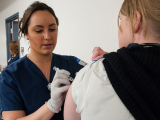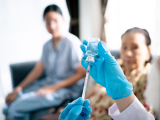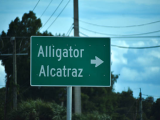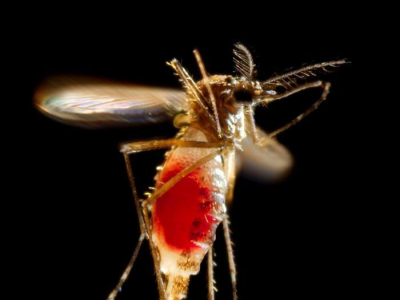Jul 30, 2010 (CIDRAP News) – The US Food and Drug Administration (FDA) today announced that it has approved the upcoming season's influenza vaccines, as four manufacturers announced they are starting to ship their first vaccine lots.
Today's approval announcement applies to six manufacturers that are making seasonal flu vaccines for the US market. This year's vaccine includes three strains:
- A/California/7/09 (H1N1)-like virus (pandemic H1N1)
- A/Perth /16/2009 (H3N2)-like virus
- B/Brisbane/60/2008-like virus
Yesterday the US Centers for Disease Control and Prevention (CDC) launched a universal flu vaccination recommendation that applies to nearly everyone except babies younger than 6 months old. Flu vaccine makers have told health officials that they expect to produce a record 170 million doses to protect Americans during the upcoming flu season.
The manufacturers supplying inactivated vaccines this year, and their vaccines, are CSL Limited, Afluria; GlaxoSmithKline (GSK) Biologicals, Fluarix; ID Biomedical Corp. (a Canadian subsidiary of GSK), FluLaval; Novartis Vaccines, Agriflu and Fluvirin; and Sanofi Pasteur, Fluzone and Fluzone High-Dose. The live vaccine, FluMist, is made by MedImmune Vaccines.
Vaccine manufacturers must obtain an FDA release for each lot of the vaccine they produce before they can ship the product to distributors. So far, four companies have received lot releases, according to press releases from the companies.
On Jul 21 MedImmune announced that it began shipping vaccine to distributors and that it expects to provide about 15 million doses for the 2010-11 flu season. Yesterday Novartis said it began shipping doses of Fluvirin ahead of schedule and said it plans to supply 40 million doses to the US market.
Today GSK announced that the FDA has cleared the way for it to begin distributing the first doses of FluLaval and said it expects to be able to start distributing its Fluarix vaccine within the next several weeks. Between the two vaccines, GSK said it expects to supply more than 30 million doses for the upcoming flu season.
Meanwhile, Sanofi today said it has begun shipping the first of 70 million flu vaccine doses that it expects to make for the US market for the upcoming flu season. Sanofi said its first shipment is headed for the CDC's Vaccines for Children Program, which provides free vaccines to physicians who care for uninsured and underinsured children.
A spokeswoman for CSL Biotherapeutics, headquartered in Australia, told CIDRAP News today that the company expects that some doses of Afluria, marketed in the US by Merck, will be available in late August, with the remaining doses available in September and October. She added that CSL expects to distribute up to 12 million doses of the vaccine during the US flu season.
In today's FDA announcement the agency said CSL's Afluria vaccine will include a labeling change to let healthcare providers know about increased incidence of fever and febrile seizure, seen mainly in children younger than 5, in the Southern Hemisphere early in that region's flu season. The FDA said CSL Limited will not be supplying the United States with the 0.25-mL prefilled syringe doses that are used in very young children but will be providing 0.5-mL prefilled syringes and 5-mL multidose vials.
The FDA said it is requiring CSL to conduct a study of Afluria in children to collect more information about the febrile episodes that occurred in the Southern Hemisphere.
In related developments, Australian health officials lifted a ban on seasonal flu vaccines for children under five, though it remains in place for CSL's flu vaccine, the Australian Associated Press (AAP) reported today. Dr Jim Bishop, Australia's chief medical officer, said monitoring shows that the fever and febrile seizure side effects in young children appear to be confined to the CSL vaccine, though ongoing investigations have not pinpointed any biological or other basis that might explain the higher side effect rate.
In a statement today, CSL said it supported the Australian regulators' cautious recommendation. Dr Darryl Maher, said, "The unexpectedly high rate of these events has not been seen in previous seasons nor following the use of our H1N1 pandemic vaccine, and our manufacturing processes have not changed." He added that CSL is working with regulators to explore more investigation possibilities.
See also:
Jul 30 FDA press release
Jul 21 MedImmune press release
Jul 29 Novartis press release
Jul 30 GSK press release
Jul 30 Sanofi press release
Jul 30 AAP story
Jul 30 CSL statement


















